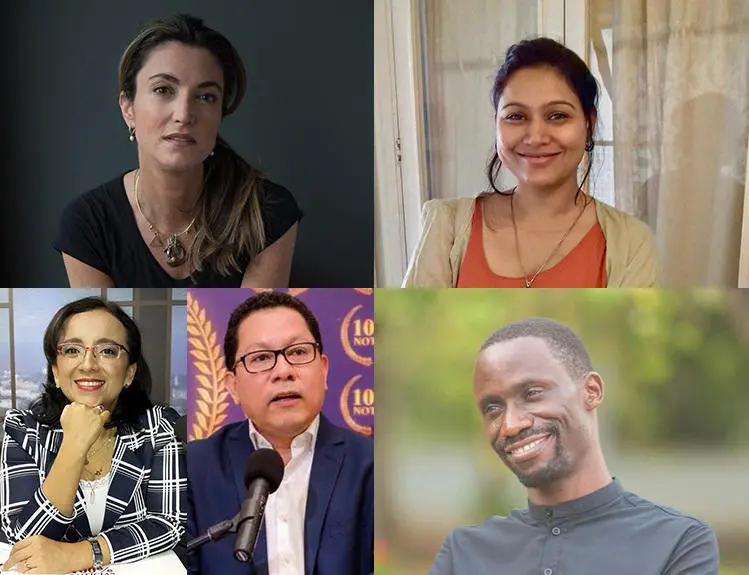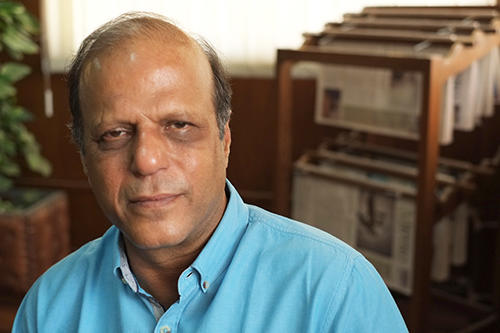CPJ is honored to present its 2019 International Press Freedom Award to Brazilian journalist Patrícia Campos Mello.
Patrícia Campos Mello is an award-winning reporter and columnist at the daily Folha de S. Paulo, one of Brazil’s biggest news outlets, and an experienced international correspondent. She has reported on human rights and public health stories in Brazil, including on babies being born with microcephaly as a result of the Zika virus in 2016. She has also reported on the war in Afghanistan, the Ebola epidemic in Sierra Leone, the national elections in India, and migration and the refugee crisis in Syria, Iraq, Libya, Turkey, Lebanon, and Kenya.
From 2006 to 2010, she was the Washington correspondent for the Estado de S. Paulo (Estadão) newspaper. Prior to that, she worked at business and finance publications including Valor Econômico and Gazeta Mercantil.
In late 2018, during the Brazilian presidential election campaign, Campos Mello was attacked online in response to her coverage of allegations about efforts by a group of businessmen supporting then-presidential candidate Jair Bolsonaro to sponsor bulk messaging on WhatsApp related to the campaign. After the stories were published, she was threatened on social media and over the phone. Callers made direct threats against her and her family, and social media users shared doctored photos and fake news stories about her. In addition, details of events in which she planned to participate were shared among hundreds of WhatsApp groups, with calls for Bolsonaro supporters to attend the events and confront her in person. Campos Mello was forced to cancel all public appearances for more than a month, and her newspaper hired a bodyguard for her. A WhatsApp number for the newspaper Folha was flooded with hundreds of thousands of messages related to her reporting.
The attack on Campos Mello was one of the most visible cases of doxxing in a year and election cycle in which dozens of journalists were harassed and criticized for their reporting. “I am more cautious in my approach to people in the new government because I worry they are going to use it against me,” Campos Mello told CPJ in December.
Campos Mello received the King of Spain Journalism Prize and the Petrobras Prize in 2018 and the Red Cross International Committee Prize for humanitarian journalism in 2017.
The text of Patrícia Campos Mello’s acceptance speech, as prepared for delivery, is below
Thank you Maria Teresa, it’s an honor to receive this award from you.
Over more than 20 years of military dictatorship, Brazilian journalists were systematically censored, persecuted, tortured and killed.
The dictatorship ended in 1985.
Thirty-four years later, in comes a democratically elected president, Jair Bolsonaro, who denies that the military rule was a dictatorship.
And journalists once again are the targets of intimidation and persecution by the government, this time with the help of social media and digital militias, lawsuits and virtual lynching.
We are living through a new form of censorship and harassment, outsourced to armies of patriotic trolls and amplified by bots on Twitter, Facebook, Instagram and WhatsApp.
And women journalists are the main victims. Much more frequently than our male colleagues, we have our parents and our children intimidated, our appearance mocked, our addresses and phone numbers exposed, and we are subject to violent threats both online and in the real world.
I have been a journalist for over 25 years, and I covered conflicts all over the world — in Libya, in Syria, Iraq and Afghanistan. I never needed a bodyguard.
Yet, when I was covering the elections last year in my hometown of São Paulo, Brazil, I needed a bodyguard.
Until last year, I had never faced a lawsuit in my whole life. I was sued by the president, who demanded that I reveal all my sources. I was sued just for doing my job. And I’m still facing a lawsuit from ne of President Bolsonaro’s supporters.
I am just one among countless women journalists in Brazil who have been targeted.
I would like to thank CPJ for this award, and I dedicate it to numerous colleagues in Brazil who have been targeted – Constança Rezende, Miriam Leitão, Marina Dias, Daniela Lima, Juliana dal Piva, and many others. This award helps us show that this kind of intimidation is not acceptable and will not become the new normal, that female journalists will not be stopped, we will continue investigating and doing journalism.
Obrigada a todos voces.

